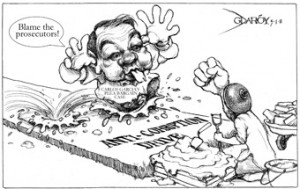Major flaw
HOW DID a custom-made Harley-Davidson motorcycle, worth $80,000 and owned by a Hollywood screenwriter, end up in the small town of Talakag in Bukidnon?
This is the question investigators are still asking one week after a team composed of policemen and agents of the National Bureau of Investigation and the US Federal Bureau of Investigation found the motorcycle and several expensive vehicles, including a Hummer and a Corvette, inside a private warehouse in Talakag. But until they find Lynard Allan Bigcas, a Cagayan de Oro car dealer known as a supplier of luxury vehicles and suspected of bringing them in, they might not find the complete answer.
What the authorities know for now is that the motorcycle was stolen in Houston, Texas, last year. They believe the other motorcycles, the cars and the sports utility vehicles also came from the United States. One source told the Inquirer the motorcycles and vehicles could have been stolen by Hispanic car thieves and shipped to Bigcas, a US immigrant who has been selling cars in Cagayan de Oro for the last 10 years. Bigcas and his group are also suspected of selling high powered firearms and ammunition to various personalities, including those with known links to terrorist organizations.
But while investigators are not prepared to say that they are on the trail of a well-organized, international smuggling syndicate, it looks like that is what Bigcas and company are running. No one can mount an operation that spans two continents and on such a scale without a fairly large and sophisticated organization and considerable resources.
Neither can they operate for long without the help of officials whose task is precisely to prevent the illegal transport of goods. And that is true on both sides of the Pacific. But let’s let the US government deal with the problem from their end. For our part what is needed is a thorough investigation of how such smuggling and gunrunning happened right under the noses of Philippine authorities. Those cars and the motorcycles “did not fly, nor did they swim or travel by land to Talakag,” as the police director for Northern Mindanao drily pointed out. They were not cocaine dumped off the shores of Eastern Samar. They arrived in container vans and passed through Philippine ports though the eyes of very “cooperative” customs officials. Thus if it wants to smash the syndicate or at least the Philippine side of it, the NBI, which is leading the investigation, should devote as much time looking for Bigcas’ contacts in the Bureau of Customs as for Bigcas himself.
This has been one major flaw in the Aquino administration’s efforts to control smuggling, this failure to run after accountable customs officials. In the last few months, the BoC has been filing smuggling charges, involving billions of pesos, against various corporations and brokerage firms, including some small oil companies, a food processing firm and an importer of palm oil. Cited in the charges are the brokers and the officials of these corporations. They stand accused mostly of undervaluing their imports and thus depriving the government of hundreds of millions of pesos in import duties and taxes. But where are the names of the customs officials who processed the questioned valuations and other documents? Were they hoodwinked or coerced into signing those documents? Or did they willfully let the valuations pass for various considerations, possibly amounting to hundreds of thousands or even millions?
Smuggling is costing the government plenty. Estimates place revenue losses from smuggling between P110 billion and P127 billion a year. More than enough to make President Aquino consider curbing smuggling as one of his administration’s priorities. The filing of cases against big companies is a step in the right direction. If prosecuted successfully, these high-profile cases may yet put the fear of the law in the hearts of dishonest businessmen. But what will put the same fear in the hearts of conniving and scheming customs officials, if no cases are filed against them? Like charity, discipline begins at home.





















